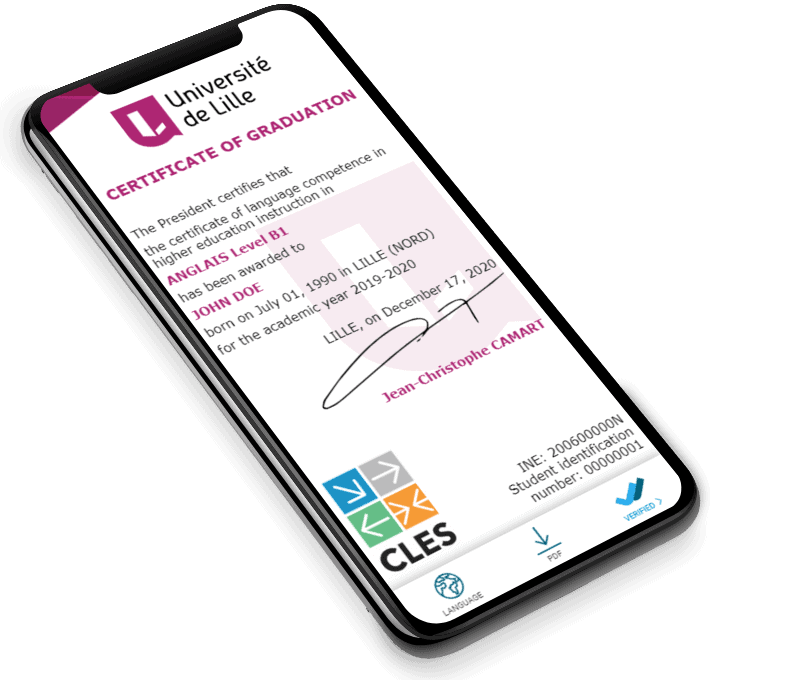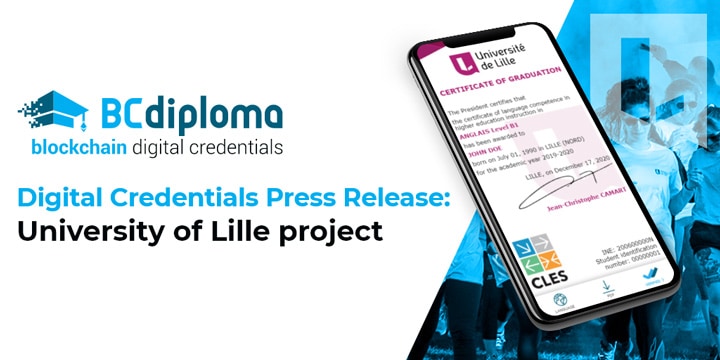Starting in July, 2021, the University of Lille will issue digital credentials for all its graduates, using blockchain technology.
When sending out diplomas today, alumni email photocopies of paper copies, which can easily be forged with photo editing software. In addition, printing and distributing paper diplomas is time-consuming, which can make it difficult to apply for a job when entering the job market. Also, requests for verification of diplomas by recruiters require the equivalent of one full-time job at the University of Lille.
Starting this year, things will change. University students will receive a link to display a digital credential shortly after graduation. They will be able to send it to a company when applying for a job, and put it as a link on their Linkedin profile. This micro credentials examples, based on blockchain technology, will provide employers with all the information they need to verify the authenticity of the diploma.
This is already implemented for university students who have obtained their language proficiency certificate (CLES, example). From July 2021, this will be extended to the entire university: all 2019-20 and 2020-21 graduates will progressively be able to benefit from it, which represents 20 to 25,000 graduates per year. The University of Lille is the first in France to deploy it on such a large scale.

The institution is very involved in the deployment of digital infrastructures for trusted public services, based on blockchain technologies. Since early 2021, the University of Lille works of the FR.EBSI project.
FR.EBSI is the French government’s contribution to the European Blockchain Public Infrastructure EBSI in order to test and deploy Digital Credentials – Verifiable Credentials (VCs), traceability registries and Distributed Identifiers (DID).
Europe does not have a central authority to certify the authenticity of diplomas from its various member countries, which is a barrier to the mobility of its workforce. Blockchain technologies provide a solution, through the use of a decentralized, unforgeable and durable database. By nature, these blockchain technologies ensure the authenticity of diplomas forever, regardless of the entity that provides them – in this case, a French company, BCdiploma. The expertise acquired by the University of Lille will then be used by all higher education institutions.
About University of Lille
The University of Lille (ULille) is a young institution resulting from the merger of the three universities of Lille on January 1st, 2018. The purpose of this merger was to strengthen the potential for excellent interdisciplinary research, to broaden the opportunities offered to students and to consolidate ULille’s position as one of the great universities at the heart of Europe. The merger has created a dynamic, high-quality multidisciplinary university.

With its 80,000 students (including 10,000 international students), 6,300 employees, 67 research units and courses covering all subject areas, ULille is a key player for training, research and innovation and commitment to social issues. In terms of governance and commitment, ULille pays particular attention to inclusive and civic projects related to the local area and stakeholders, to promoting campus life and to using a social responsibility-based approach. ULille is a comprehensive university covering a wide range of fields of study.
Geographically, ULille is located within a region in transition, characterized by a position close to several major metropolitan areas and European capitals, and exceptionally well connected by an extensive world-class transport infrastructure.As the construction of a European space and international scientific cooperation have been at the top of its agenda over the past few years, ULille has developed an international strategy in line with European programmes: Erasmus+ to promote student exchanges, international staff mobility and strategic partnerships and to foster innovative EU and international research projects.
Since 2018, supported by the Ministry for National Education, Youth and Sport, Perrine de Coëtlogon, Blockchain & Open Education within the Directorate for Pedagogical Innovation and Pierre Boulet, Vice-President of ULille for Digital Transformation, have been hosting a national working group “Blockchain Education France”. Thanks to the open and distributed infrastructure of this technology, the group has been tackling the question of modernization of the educational departments (dematerialization of diplomas and any certificates) with a strong pan-European and international focus on values and rules (European acquis) and standards.
Perrine has been appointed as the French contact point within the European Blockchain Partnership and Pierre, as the member of its technical group. They are both members of the use case “Diplomas and credentials”, one of the first four use cases selected by the state members and DGCNECT to be tested on the European Blockchain Service Infrastructure. Perrine has also been invited to review the white paper of the Digital Credentials Consortium led by the MIT Media Lab, Learning Technologies.
About BCdiploma
Blockchain Certified Data – BCdiploma is a French software publisher specialized in blockchain technologies. As a pure player, it has been contributing since 2017 to the creation of an international ecosystem of digital credentials.
Blockchain Certified Data patented a method combining cryptography and blockchain and markets BCdiploma, a B2B SaaS solution that allows any institution to issue the latest generation of blockchain micro credentials. BCdiploma is a forerunner in terms of respecting private data stored on a blockchain. It enables the authentication, security and storage of credential data. Students, graduates and citizens thus have lifetime authentic certificates that can be freely used and instantly verified without any procedure.
BCdiploma is deployed in more than 100 institutions in +17 countries with the following use cases: diploma, academic and continuing education certificate, certified open badge of proficiency, notarial certificate, ISO certificate.
Interoperability with open standards (Open Badges, Verifiable Credentials data model of the W3C and Digital Credentials Consortium) is key to BCdiploma’s work and guarantees backward compatibility with emerging standards. The durability of the BCdiploma ecosystem is based on its decentralized architecture: smartcontract, an inclusive register of issuers and validators.

As a stakeholder in the debates on blockchain governance and energy consumption, in collaboration with Blockchain Education France and the European Blockchain Partnership, BCdiploma has developed a cross-chain expertise allowing the deployment of its service on different blockchains, such as Smart Chain or EBSI.
Through the wide range of its expertise: research, operational development, collaborations with the world of training, education, universities, companies and public institutions, BCdiploma intends to contribute to the European dialogue and blockchain initiatives.
